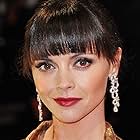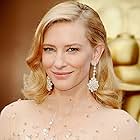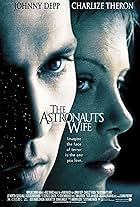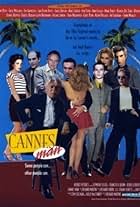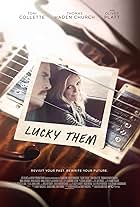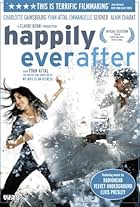A young refugee traveling from Russia to America in search of her lost father falls for a gypsy horseman.A young refugee traveling from Russia to America in search of her lost father falls for a gypsy horseman.A young refugee traveling from Russia to America in search of her lost father falls for a gypsy horseman.
- Awards
- 3 wins & 3 nominations
- Director
- Writers
- All cast & crew
- Production, box office & more at IMDbPro
Storyline
Did you know
- TriviaChristina Ricci and Johnny Depp found it strange and amusing to do sex scenes with each other because they first met when she was 9 and he was 26, when he visited the set of her debut film Mermaids (1990) to see his then-girlfriend Winona Ryder. She said during an interview with ABC News, "I've known Johnny so long, he's protective of me as an older brother and it's weird to think of having sex with him. So we know enough about each other to laugh at it. He said it was 'like we were rooting around together like pigs.' Anyway, I don't think you ever really deal with sexuality on-screen. There are, like, 50 people watching you, and you're just, like, 'Uh, I hope my ass looks good.' There's no deep feeling there. It's just embarrassing."
- GoofsIn the scene where Suzie is following Cesare and his friends on her bike, they go through a passage where you can see the Eiffel Tower in the background and it is lit up. However, the lights were not added to the Tower until 1986.
- SoundtracksJe crois entendre encore (Yiddish Version)
from "The Pearl Fishers"
by Georges Bizet
Performed by Salvatore Licitra and Orchestra of the Royal Opera House
Concertmaster Vasko Vassilev
Featured review
Christina Ricci sings more than she speaks in the movie, but she manages to hold your attention nevertheless for a pretty solid hour and a half in this well-acted and profound, but uneven period piece. Sally Potter, who also directed the similarly problematic "Orlando", clearly has the visual and thematic talent to be a much better respected director than she is - she just needs to learn how to tell a story.
The first forty minutes of the film, which begins in the year 1927, are absolutely masterful. The sublime Claudia Lander-Duke plays young Fegele, an impoverished Russian-Jewish girl whose beloved father decides to journey to America in search of a better life. After that, Fegele and her family are set upon by unnamed bad guys (probably either Cossacks or Communists), and Fegele is separated from them. She ends up on an ocean liner bound for England, where her name is changed to Susan, she is adopted by an English family that doesn't understand her, and she is forced to begin the process of assimilation.
Flash forward ten years or so (Potter is regrettably and consistently unspecific about such things). Fegele (now Suzie and now played by Christina Ricci, she of the large, expressive eyes) wants to be a showgirl so she can earn money to go to America and find her father. She auditions and is accepted by a group based out of Paris. Once in Paris, she rooms and becomes tight with fellow showgirl Lola (Cate Blanchett), a somewhat vapid and materialistic creature with no ambition save that of landing a rich man - which she manages to do in the form of opera singer and Mussolini supporter Dante Dominio (John Turturro, in one of his better performances). Around the same time, Suzie meets and falls in love with Cesare (Johnny Depp), the leader of a band of gypsies.
Once all the dominoes are in place, Potter wastes no time in knocking them down. You can see trouble coming a mile away: Lola, Suzie's one confidant who is aware of her Jewish ancestry, begins falling under the emotional and political spell of anti-Semitic, gypsy-hating fascist Dante. Meanwhile, the Nazis have invaded Poland and, despite everyone's self-assured predictions that they'll stop there, the French border is neither geographically nor historically distant. Suddenly, it's a race against time for all involved, but especially for Suzie - will she stay behind with her gypsy king, or, given a choice, will she escape certain death? The problem with all of this is that it's all so familiar. Potter adds nothing to the old story. There are some wonderful messages in this film about multiculturalism, nationalism, and the sometimes subtle nature of fascism, but if you don't care about the story you're not going to be interested in listening to the messages. The gypsy subplot, for instance, seems tacked on, like it was an excuse to give Ricci a love interest and have him be played by Johnny Depp.
The really interesting plot line here involves Lola and Dante, and I would pay ten dollars to see a movie that was just about them. Both Blanchett and Turturro create real, flesh-and-blood human beings, and it's in their scenes that Potter's writing really soars. Watching Dante sink deeper and deeper into a political philosophy fueled by his own insecurity while the irrepressibly optimistic Lola tries to turn a blind eye to it all is a fascinating and marvelous experience.
Ricci gives a good performance too, although occasionally that Valley Girl tone she uses in most of the rest of her movies slips out a little too much here and there. Fortunately, Potter doesn't give the shy, quiet Suzie very much to say. Most of her acting is done with her eyes, and she's really quite good. Johnny Depp does what he can with Cesare, but there's only so much an actor can accomplish when playing a plot device.
Art direction, music, and cinematography were all top-drawer. As is par for the course with Sally Potter's films, it looked good and had some interesting things to say. I just wish it had been more compelling.
The first forty minutes of the film, which begins in the year 1927, are absolutely masterful. The sublime Claudia Lander-Duke plays young Fegele, an impoverished Russian-Jewish girl whose beloved father decides to journey to America in search of a better life. After that, Fegele and her family are set upon by unnamed bad guys (probably either Cossacks or Communists), and Fegele is separated from them. She ends up on an ocean liner bound for England, where her name is changed to Susan, she is adopted by an English family that doesn't understand her, and she is forced to begin the process of assimilation.
Flash forward ten years or so (Potter is regrettably and consistently unspecific about such things). Fegele (now Suzie and now played by Christina Ricci, she of the large, expressive eyes) wants to be a showgirl so she can earn money to go to America and find her father. She auditions and is accepted by a group based out of Paris. Once in Paris, she rooms and becomes tight with fellow showgirl Lola (Cate Blanchett), a somewhat vapid and materialistic creature with no ambition save that of landing a rich man - which she manages to do in the form of opera singer and Mussolini supporter Dante Dominio (John Turturro, in one of his better performances). Around the same time, Suzie meets and falls in love with Cesare (Johnny Depp), the leader of a band of gypsies.
Once all the dominoes are in place, Potter wastes no time in knocking them down. You can see trouble coming a mile away: Lola, Suzie's one confidant who is aware of her Jewish ancestry, begins falling under the emotional and political spell of anti-Semitic, gypsy-hating fascist Dante. Meanwhile, the Nazis have invaded Poland and, despite everyone's self-assured predictions that they'll stop there, the French border is neither geographically nor historically distant. Suddenly, it's a race against time for all involved, but especially for Suzie - will she stay behind with her gypsy king, or, given a choice, will she escape certain death? The problem with all of this is that it's all so familiar. Potter adds nothing to the old story. There are some wonderful messages in this film about multiculturalism, nationalism, and the sometimes subtle nature of fascism, but if you don't care about the story you're not going to be interested in listening to the messages. The gypsy subplot, for instance, seems tacked on, like it was an excuse to give Ricci a love interest and have him be played by Johnny Depp.
The really interesting plot line here involves Lola and Dante, and I would pay ten dollars to see a movie that was just about them. Both Blanchett and Turturro create real, flesh-and-blood human beings, and it's in their scenes that Potter's writing really soars. Watching Dante sink deeper and deeper into a political philosophy fueled by his own insecurity while the irrepressibly optimistic Lola tries to turn a blind eye to it all is a fascinating and marvelous experience.
Ricci gives a good performance too, although occasionally that Valley Girl tone she uses in most of the rest of her movies slips out a little too much here and there. Fortunately, Potter doesn't give the shy, quiet Suzie very much to say. Most of her acting is done with her eyes, and she's really quite good. Johnny Depp does what he can with Cesare, but there's only so much an actor can accomplish when playing a plot device.
Art direction, music, and cinematography were all top-drawer. As is par for the course with Sally Potter's films, it looked good and had some interesting things to say. I just wish it had been more compelling.
- tideprince
- Jan 14, 2005
- Permalink
- How long is The Man Who Cried?Powered by Alexa
Details
- Release date
- Countries of origin
- Official site
- Languages
- Also known as
- Людина, яка плакала
- Filming locations
- Paris, France(on location)
- Production companies
- See more company credits at IMDbPro
Box office
- Gross US & Canada
- $747,092
- Opening weekend US & Canada
- $93,455
- May 27, 2001
- Gross worldwide
- $1,322,763
- Runtime1 hour 40 minutes
- Color
- Sound mix
- Aspect ratio
- 1.85 : 1
Contribute to this page
Suggest an edit or add missing content










